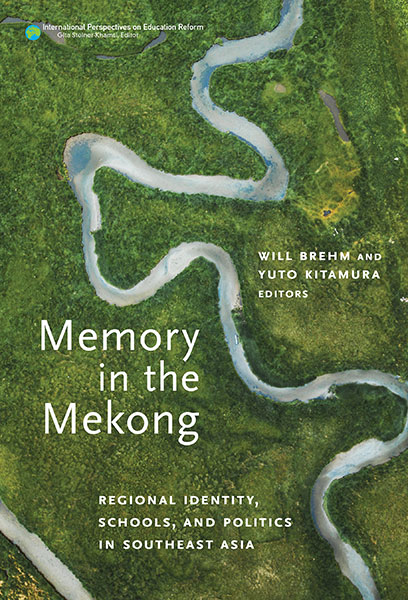Professors: Request an Exam Copy
Print copies available for US orders only. For orders outside the US, see our international distributors.
Edited by: Will Brehm, Yuto Kitamura
Foreword by: Thongchai Winichakul
Afterword by: Shigeru Aoyagi
Publication Date: March 4, 2022
Pages: 216
Series: International Perspectives on Educational Reform Series

This edited collection explores the possibilities, perils, and politics of constructing a regional identity. The Association of Southeast Asian Nations (ASEAN), a multinational institution comprised of 10 member states, is dedicated to building a Southeast Asian regional identity that includes countries along Southeast Asia’s Mekong River delta: Cambodia, Thailand, Vietnam, Laos, and Myanmar.
After successfully establishing an economic community in 2015, where capital and people can freely move across national borders, ASEAN and its partners now aim to develop a sociocultural community that is fully functional in a wide range of sectors by 2025. As part of this vision, ASEAN wishes to construct a regional identity by uniting over 600 million people, which will be achieved partly through national school systems that teach shared histories. In this text, the contributors critically examine the many questions that arise in the face of this significant change: What does an ASEAN identity look like? Is it even possible or desirable to create a common identity across the diverse peoples of Southeast Asia? Given the divergent memories of history, how would a regional identity exist alongside national identity? Memory in the Mekong grapples with these questions by exploring issues of shared history, national identity, and schooling in a region that is frequently underexamined and underrepresented in Western scholarship.
Book Features:
Will Brehm is an associate professor at the UCL Institute of Education, University College London. Yuto Kitamura is a professor at the Graduate School of Education, University of Tokyo.
“Mainstream scholarship on the cultivation of social identities in school education often focuses on just national, ethnic, or religious identities. What is noteworthy about Memory in the Mekong is that it examines the fascinating aspect of a unified regional identity in the Mekong subregion, one of the most diverse places on Earth. As a result, this endeavor generates complex insights that will interest not just practitioners and scholars of history and citizenship education but any reader interested in themes of nationhood, belonging, and identities.”
—Harvard Educational Review
“An essential resource that should be on the bookshelves of all academics, practitioners, and students interested in the topics of historical memory, curriculum development and reform, and identity.”
—Comparative Education Review
“ Memory in the Mekong, a well-crafted book, fills a gap in the literature, bringing together diverse perspectives. The case studies also provide a fascinating glimpse into the international relations in the region.”
—Sir Read a Lot
“As this book suggests, formal education and public culture are interconnected. A scholarly enterprise like this book, too, succeeds when it leaves readers with more questions than answers. I hope the book makes readers more curious to find more puzzles about school, history education, and Southeast Asia.”
—From the Foreword by Thongchai Winichakul, emeritus professor, University of Wisconsin–Madison
“This is a pathbreaking work at the intersection of international relations, the politics of education, and the construction of historical memory. It shows how politics constructs and contests various forms of regional identity. Drawing on the countries in the Mekong, these empirically rich examinations will have a theoretical reach far beyond the case studies. Highly recommended.”
—Kanishka Jayasuriya, professor, Murdoch University, Australia
“Memory in the Mekong is a masterfully and artfully crafted exploration of the contested cultural politics surrounding the making of an imagined regional identity and the role of education in its creation. More importantly, this must-read collection fills in an important silence on the literature of education and regionalism.”
—Susan L. Robertson, professor of sociology of education, University of Cambridge
“The Mekong is the economic and cultural artery of mainland Southeast Asia and crucial to the region’s interaction with China. By exploring memory and identity, this book offers a fascinating glimpse into Southeast Asia’s past and future.”
—Amitav Acharya, Distinguished Professor of International Relations and The UNESCO Chair in Transnational Challenges and Governance, School of International Service, American University
Contents
Foreword Thongchai Winichakul ix
Acknowledgments xi
Introduction: Toward a Southeast Asian Identity? Schools as Contested Sites of Collective Memory 1
Will Brehm
Part I: Regional Memory
1. The UNESCO Shared Histories Curriculum: Paradoxes and Possibilities 23
Rosalie Metro and Will Brehm
2. Regional Memory in Contemporary Cambodia: “Cautious Resistance and Calculated Conformity” 47
Will Brehm
Part II: National Memory
3. Whose Kingdoms and Whose Settlement? Hegemonic National Memory Inside Thai Textbooks 75
Vong-on Phuaphansawat and Will Brehm
4. Vietnamese Citizenship in Transition: State Curricula Pre- and Post-Doi Moi 103
Bich-Hang Duong
Part III: Public Memory
5. Thinking With History in Pursuit of Truth in Myanmar 133
Anna Zongollowicz
6. Finding Unity in Diversity: Public Identity Patterns in Lao PDR 153
Will Brehm, Thongdeuane Nanthanavone, Somsanit Larvankham, and Yasushi Hirosato
7. Exploring Unity and Diversity in the Histories of Southeast Asia 177
Yuto Kitamura
Afterword Shigeru Aoyagi 187
About the Editors and Contributors 191
Index 193
Professors: Request an Exam Copy
Print copies available for US orders only. For orders outside the US, see our international distributors.